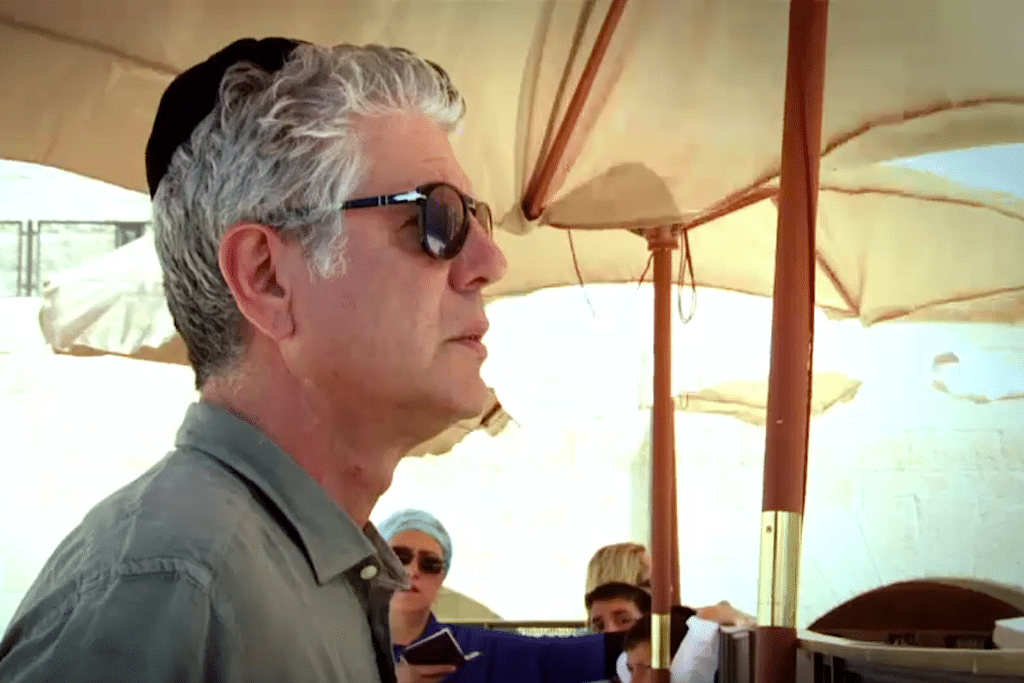Skift Take
"Parts Unknown" is back and with two Emmys in its pocket. Season two's strong start in a challenging location highlights all the reasons that it stands out among travel and news TV: It uses a meal as the entry point to a deeper honest conversation about culture, politics, and people.
Anthony Bourdian’s Emmy-winning series Parts Unknown returned to CNN for its second season on Sunday night.
It aired just as the program won two Emmys for best information series and outstanding cinematography for nonfiction programming for season one’s trip to Myanmar.
Bourdain starts the season on a very strong note and an extremely challenging location. It is the well-traveled host’s first time to Israel and Palestine.
As a self-described non-religious man, Bourdain says he comes to the state with few preconceived notions. He describes Israel as “pretty, awesome, and hip…like a southern California, only nicer” until the sight of young draftees in the streets remind him that he’s not in San Diego.
The show gets straight to smashing cultural and culinary misperceptions as Bourdain walks through the streets of Jerusalem with Yotam Ottolenghi, chef and co-author of Jerusalem: A Cookbook.
Ottolenghi explains how falafel, popularly thought of an Israeli food, is actually Palestinian.
The duo then walk down Via Dolorosa, the Biblical setting for Jesus’ walk with his cross, where Bourdain finds one of the most unique travel souvenirs we’ve yet to see: a personal crown of thorns.
ZPZ Productions, the creative force behind all of Bourdain’s TV shows, then does what it does best. It adds context with an an animated map that gives a brief overview of the region’s history.
After a trip to the southern Israeli city of Eliat, Bourdain travels into Palestine where he spends the remainder of the episode exploring small villages and revealing a side of Palestinian culture few Americans have seen.
“A Crazy Country”
Outside of Ramallah, Bourdain meets the Speed Sisters, the first all-female Palestinian racing team. The women ride on roads outside of the Israeli jail Ofer.
“You never know what’s going to happen in Palestine…It’s a crazy country,” the female driver tells Bourdain who sits in the passenger seat.
Inside the West Bank, Bourdain describes the Israeli-built barrier as “something from a science fiction film.” A place where 66 percent of a town’s population is under 18 years old, but there is not a playground or green place in sight.
https://twitter.com/HelenCho/status/379416421412786177/photo/1
Bourdain’s time spent with road racers and theatre leaders is important as the show continues to move beyond food to conversations that look at place’s culture, history, and its future.
An Alternate Universe
The most scintillating meal of the episode is found in a restaurant just 20 minutes outside of Jerusalem. The restaurant, the love child of a Jewish woman and Muslim man, serves Bourdain a vegetarian meal so delicious that he hardly misses the meat.
Much of food used to prepare the fried eggs with peppers and fresh zucchini with apricots is grown inside the restaurant’s garden. The meals reflect the chefs’ Israeli and Palestinian backgrounds and their commonalities.
Baked Baby Watermelons
Calling the trip in and out of Gaza “one of the most surreal travel experience you can have on earth” is a lot coming from someone as well-traveled as Anthony Bourdain.
Laila El-Haddad, a journalist and author of Gaza Kitchen, is Bourdain’s guide throughout southern Gaza. He eats a dish of fried eggplant, tomato, caramelized onions, chicken, and rice with her family where El-Haddad explains the importance of cuisine to her culture:
“For me, being from Gaza, being a child of diaspora, I always thought food was a really interesting way to be able to tell the Palestinian story. Being able to discover this lost history, this Palestinian past. Plus the food is really damn good.
El-Haddad also introduces Bourdain to a watermelon salad that is cooked by wrapping unripe watermelons in aluminum foil, stringing them on a wire, and putting them in a fire. The food in the region is so distinct that she says people living in Gaza City, only 35 minutes from where they sit, would not recognize the dish.
Parts Unknown ends the episode on a cautiously optimistic note. It feeds on the warm hospitality that cultures around the world have extended to Bourdain and his crew as a sign of hope, but adds a dash of raw realism.
“…both of them cook with pride, eat with passion, love their kids, love the land in which they love or the land they dream of returning to, who live so close, who are locked in such an intimate deadly embrace might somehow some day learn to live with each other. But that would be very mushy thinking indeed.”
What Twitter Says
Parts Unknown is coming off a very successful first season and impressed viewers with its mix of gorgeously shot cuisine and tough topics in the first episode of season two.
There was much praise on Twitter for how the show covered a region that stumps many major new organizations, and some disappointment that the team did not spend more time in Israel.
https://twitter.com/Zaytawy/status/379426600648835072
Amazed & surprised @Bourdain is asking the hard questions & not shying away on #PartsUnknown.
— Rafat Ali (@rafat) September 16, 2013
Love what #PartsUnknown is doing. Food transcends borders, ethnicity, religion. It needs an hour follow-up episode to explain the politics.
— Dave Rubin (@RubinReport) September 16, 2013
Covering the entirety of the situation in #israel in 1hr is daunting, but @bourdain #PartsUnknown did well. Not much of Jerusalem though.
— Matt Barnett (@MBinTown) September 16, 2013
The Daily Newsletter
Our daily coverage of the global travel industry. Written by editors and analysts from across Skift’s brands.
Have a confidential tip for Skift? Get in touch
Tags: anthony bourdain, food and drink, israel, parts unknown
Photo credit: Anthony Bourdain looks at the Western Wall in Jerusalem. Screenshot / Parts Unknown
